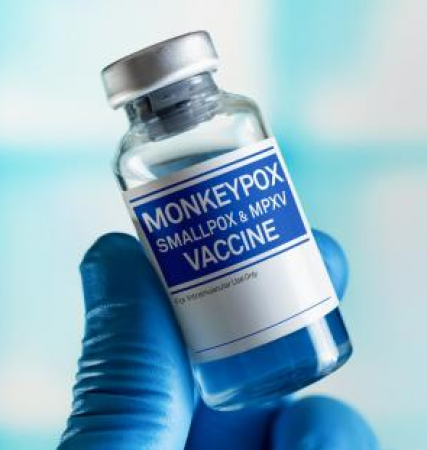
United Nations: Public health officials are warning that wealthy countries' decision to buy large quantities of monkeypox vaccine while refusing to share doses with Africa could leave millions more vulnerable to a more dangerous strain of the disease and further human virus spread. may be at risk.
Critics worry about a repeat of the dire inequality issues that existed during the coronavirus pandemic.
Dr. Boghuma Kabisan Titanji, assistant professor of medicine at Emory University in Atlanta, Georgia, US, said that "the mistakes we saw during the COVID-19 pandemic are already being repeated."
Wealthy countries have ordered millions of vaccines to fight monkeypox within their borders, but none of them plan to distribute doses to Africa, where the disease is spreading more deadly than in the West .
Since May, nearly 80 countries have reported more than 22,000 cases of monkeypox, with about 75 suspected deaths occurring in Africa, mostly in Nigeria and Congo. The first cases of monkeypox-related deaths outside Africa were reported on Friday in Brazil and Spain. The second case of monkeypox was reported in Spain on Saturday.
In discussions about the global response, "African countries dealing with monkeypox outbreaks for decades have been taken back on a footnote," claimed TitanG.
According to scientists, unlike campaigns to prevent Covid-19, mass vaccination against monkeypox will not be required. They believe that by using available supplements strategically, among other actions, it will be possible to stop the spread of the pandemic, which was recently classified by the World Health Organization as a global health emergency.
The need for vaccines could increase if the disease spreads to the general population, experts warn, even though monkeypox is much less contagious than Covid-19. Currently, in Europe and North America, the disease is affecting almost exclusively gay and bisexual men.
The Africa Centers for Disease Control and Prevention on Thursday demanded that the continent receive vaccination priority as it was once again being ignored.
Ahmed Ogwell, acting director of the Africa CDC, said that "if we are not safe, the rest of the world is not safe either."
Although monkeypox has been endemic in some areas of Africa for decades, it generally only spreads to people when wild animals become infected, and it has not usually spread far outside the continent.
Before the disease began to spread through sex in two waves in Spain and Belgium, experts believed that monkeypox outbreaks in North America and Europe may have started in Africa. Currently, more than 70% of all monkeypox cases worldwide occur in Europe, and 98% of these cases affect men who have sex with other men.
The deaths in Spain did not change the agency's assessment of the outbreak, according to Catherine Smallwood, a senior WHO Europe emergency official.
She wrote in an email, "Monkeypox can cause serious complications, even though the disease is generally self-limiting. About 8% of infections reported hospitalization, and monkeypox can sometimes lead to life-threatening complications such as encephalitis. Bullying can result in complications.
According to Smallwood, we can anticipate more fatalities as monkeypox continues to spread across Europe.
WHO is building a system to share vaccines with affected countries, but little information has been made public about how it might operate. The UN health agency has only stated that vaccines will be given on the basis of epidemiological need; There are no guarantees regarding prioritizing poor countries in Africa.
Now first monkeypox-related death confirm in Brazil
WHO says monkeypox outbreak can be stopped if needed actions taken